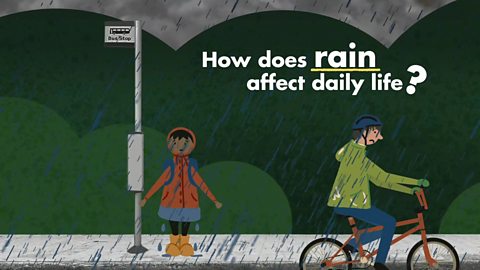Why does it rain more in some places than others?
Some places get much more rain than others. This can be because of the amount of water nearby, the direction of the wind, and how close they are to mountains. Why do these make a difference?
In this article you can learn:
- Why it rains more in some places than others
- How clouds form
- What a rain shadow is
This resource is suitable for weather topics for primary school learners.
Video - Why it rains more in some places than others
Watch this video to discover what causes it to rain more in some places than others.
Grab your umbrella, it's another wet day.
It rains a lot across Scotland, but that rain isn’t evenly spread. Some places get much more rain than others. Why does this happen?
For it to rain you need clouds, and clouds need two things to form.
The first thing clouds need is a source of water. Water evaporates when heated up by the sun and turns into water vapour.
Scotland is surrounded by sea, so there is plenty of water for the sun to evaporate. This means there’s a lot of water vapour in the air, ready to form clouds.
Most of the time in Scotland the winds come from the west, known as a westerly wind. This brings relatively warm wet air from over the North Atlantic Ocean causing clouds to form over the west of Scotland – where it tends to be rainier!
The second thing clouds need is for the air to cool down. This can happen if warm air meets colder air. And mountains are great for cooling the airdown too - and Scotland has loads of mountains!
Those westerly winds blow warm wet air from the sea onto the land and the mountains force the air upwards. As the air rises it cools down. The vapour turns back into drops of water, forming clouds. And clouds bring rain.
The sea, the warm winds and tall mountains all work together to create clouds and rain across Scotland.
The closer you are to the sea, the west, or mountains, the more rain you will probably get.
Winds keep blowing the air east out of the mountains and across lower ground. As the air sinks lower and starts warming up again, the clouds evaporate andthere is less rain.
That’s why Dundee on the east coast is one of the driest places in Scotland and gets 700 - 800mm of rainfall a year. Places like Dundee, that are more shelteredfrom wind and moisture by mountains, are said to be in a 'rain shadow'. Places further west and higher up tend to be wetter. The village of Crianlarich can receive up to 3000mm of rainfall a year!
Why don’t you investigate how much rain your area gets each year? Compare it with some other places. Which is wetter? And can you work out why?
What is the water cycle?
Rain is a type of precipitationMoisture that falls from the clouds. Snow, rain, hail and sleet are all examples of precipitation.. It is part of the water cycleThe process in which water travels from the Earth's surface, up into the sky and back to Earth again. The three steps of the water cycle are evaporation, condensation and precipitation..
- Sorry, something went wrongCheck your connection, refresh the page and try again. - the sun heats up water on land, in rivers, lakes and seas and turns it into water vapourWater when it is an invisible gas..
- Sorry, something went wrongCheck your connection, refresh the page and try again. - the water vapour rises into the air. Water vapour in the air cools down and changes back into tiny drops of liquid water, forming clouds.
- Sorry, something went wrongCheck your connection, refresh the page and try again. - the clouds get heavy and water falls back to the ground in the form of rain, hail, sleet or snow.
- Rain water runs over the land and collects in lakes or rivers, which take it back to the sea. The water cycle starts all over again.
Learn more about the different stages of the water cycle here: What is the water cycle?
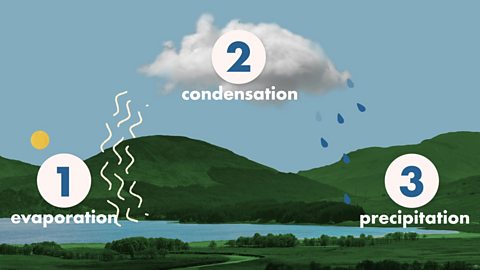
Why do some places get more rain?
Source of water
- If there is more water for the sun to evaporateWhen water turns from a liquid into a gas., there will usually be more clouds and more rain. This water could come from the sea, lochs, rivers and even garden ponds!
- Scotland, and the rest of the UK, is surrounded by sea so there is lots of water for the sun to evaporate. This makes it quite rainy compared to countries that are far inlandA place that is far away from the coast..
Wind direction
- Most of the wind in Scotland come from the west, known as westerly winds or westerlies.
- Westerlies bring warm moist air from over the North Atlantic Ocean.
- Warm wet air is perfect for forming clouds - meaning more rain!
- That's why the west coast of Scotland is often rainier than the east coast.
Mountains
- For clouds to form, the air temperature needs to be cold enough for water to condenseWhen water turns from vapour to liquid. from water vapour into tiny liquid water droplets.
- Mountains are great at cooling air down.
- Westerly winds blow warm wet air from the sea onto the land and the mountains force the air upwards. As the air rises, it cools down. The vapour turns back into drops of water, forming clouds. Clouds bring rain.
- This is why places up high tend to be wetter.
- On the other hand, mountains can also shelter places from wind and rain. This is called a rain shadow.
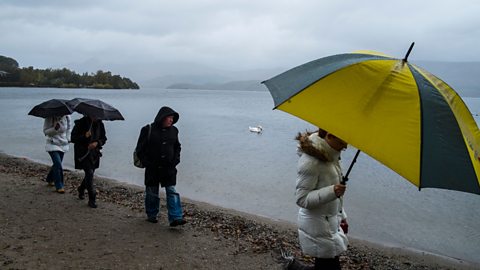
Image caption, Source of water
The amount of water nearby can affect the amount of rain we get. If there is more water for the sun to evaporate, there will usually be more clouds and more rain. This water could come from the sea, rivers or lochs.
Image caption, Wind direction
The amount of rain we get in Scotland is affected by the wind direction. Most of the wind in Scotland are westerlies, which bring warm moist air from over the sea. This is perfect for clouds forming - meaning more rain!
Image caption, Mountains
For clouds to form, the air temperature needs to be cold enough for water to condense into liquid water droplets. Mountains are great at cooling air down. However, mountains can also shelter places from wind and rain.
1 of 3

Key words about rain
- the water cycle - How water travels from the Earth's surface, up into the sky and back to Earth again.
- evaporate - When water turns from a liquid into a gas (water vapour).
- condense - When water turns from a gas (water vapour) into a liquid.
- precipitation - Moisture that falls from clouds. Snow, rain, hail and sleet are all examples of precipitation.
- water vapour - Water when it is an invisible gas.
- westerly winds - Warm moist winds which bring rain from the Atlantic.
- annual rainfall - How much rain a place gets every year.
- rain shadow - Places that are sheltered from wind and moisture by mountains.
Test your knowledge
Interactive map
Click on the map of Scotland below to find out how much annual rainfall each place gets.
Question
Can you think of any features that might affect how much rain the places on this map get?
- Shetland is a group of islands (an archipelago) so it is surrounded by sea. This means there is lots of water to evaporate, which will eventually turn into clouds and rain.
- Crianlarich is near the west coast of Scotland where westerlies bring warm moist air from over the North Atlantic Ocean. Warm wet air is perfect for forming clouds which means there is a higher chance of rainfall.
- Dundee is on the east coast of Scotland so it is less affected by westerly winds. It is also in a rain shadow because it is sheltered from wind and rain by mountains.
- There are many hills and mountains in Dumfries. Mountains are great at cooling air down, which means there is a higher chance of rain.
Challenge

Investigate how much rain your area gets each year.
Can you compare where you live with some other places? Which is wetter? Can you work out why?
Some ideas to think about:
- Do you live close to the sea or another large body of water?
- How close are you to the west coast where westerly winds bring warm wet air?
- Do you live near a mountain that is cooling the air?
- Are you in a rain shadowAn area that is sheltered from wind and moisture by mountains.?
More about rain and the water cycle
What is rain? revision-guideWhat is rain?
It rains quite a lot in Scotland but what is rain and where does it come from?
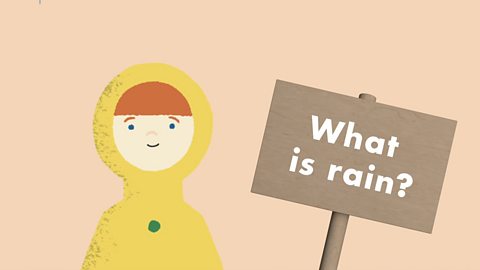
The water cycle. revision-guideThe water cycle
Rain is an important part of the water cycle. Find out more.
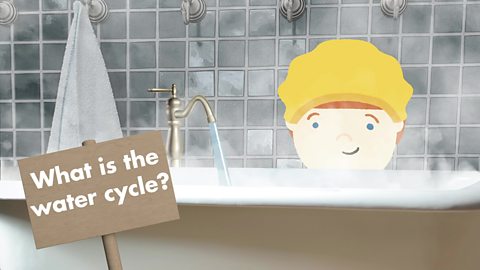
How does rain affect daily life? revision-guideHow does rain affect daily life?
Rain can affect our lives in many different ways.
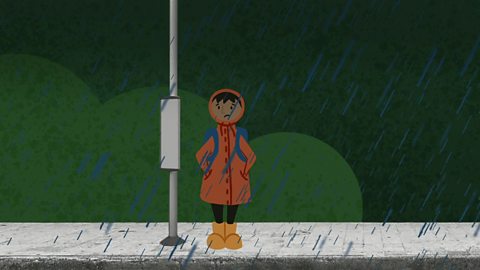
Hydroelectric energy
Find out how we can use rain water to generate renewable electricity.
Hydroelectric energy is a type of renewable Something that does not run out when used. energy that uses the power of moving water (hydropower) to generate electricity.
Hydroelectricity. revision-guideHydroelectricity
We can harness all the rain we get in Scotland to generate renewable energy
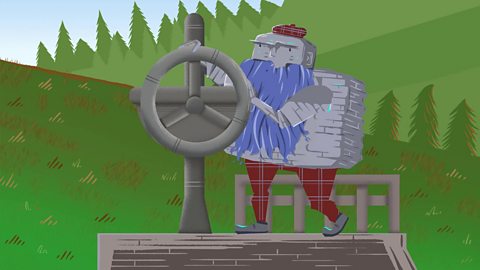
More on Weather
Find out more by working through a topic
- count14 of 24

- count16 of 24
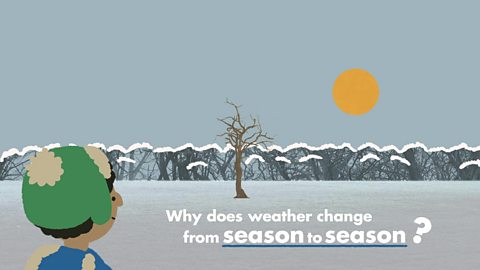
- count17 of 24
